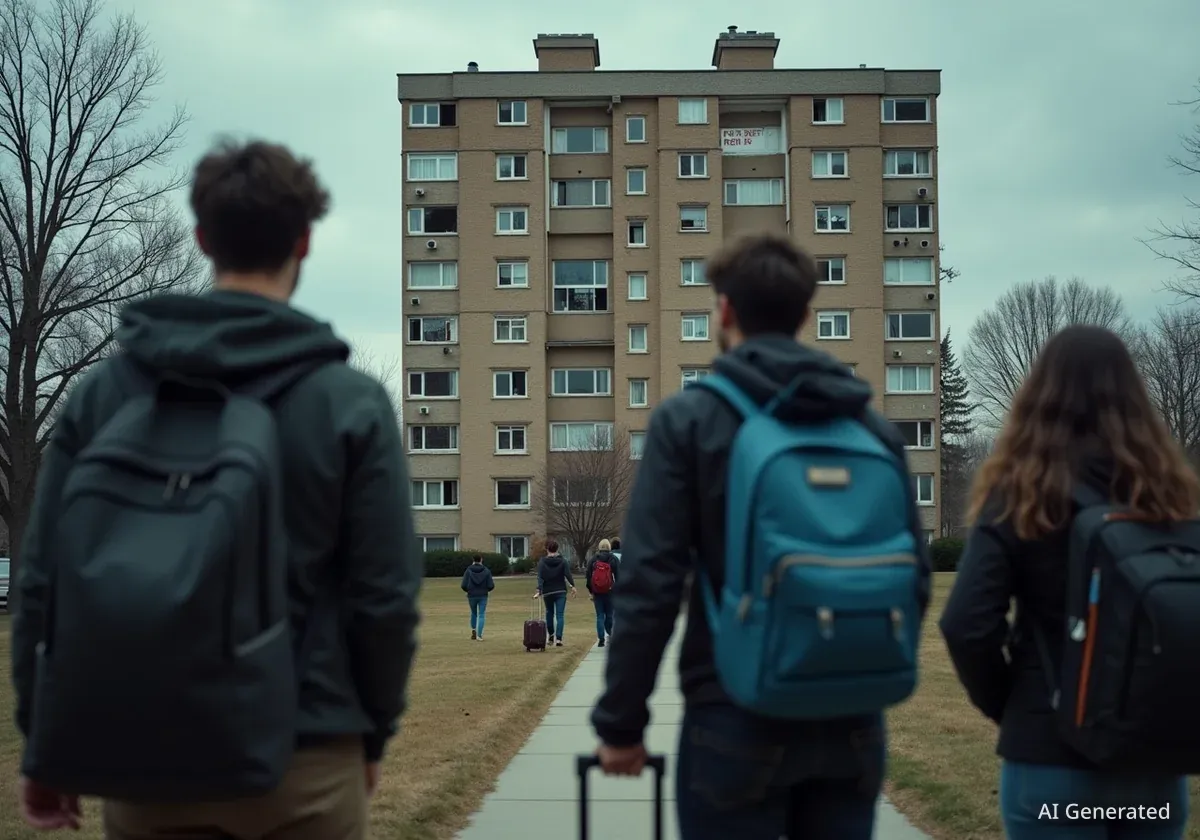The University of Connecticut is accommodating a record number of students in on-campus housing, but a surge in enrollment has left many searching for limited and expensive off-campus alternatives. This housing shortage has created significant financial and emotional stress for students who expected to live on the Storrs campus.
As the university's popularity grows, the demand for student housing has outpaced the available supply. This has led to a competitive and costly rental market in the surrounding area, impacting students' budgets and overall university experience.
Key Takeaways
- UConn's undergraduate enrollment at its Storrs campus has increased by over 1,500 students since 2020.
- The university is housing a record 13,400 students, but on-campus facilities are at full capacity.
- Students report significant financial strain, with off-campus housing costing more than double the price of some on-campus options.
- Some students, including those in the Honors Program, were initially waitlisted for housing they believed was guaranteed.
Enrollment Growth Outpaces Housing Supply
The core of the housing issue stems from the University of Connecticut's rising enrollment figures. In the fall of 2020, the Storrs campus had 18,917 undergraduate students. By the fall of 2025, preliminary numbers show that figure has climbed to approximately 20,500.
In response, UConn is currently housing nearly 13,400 students, an institutional record. According to university spokesperson Stephanie Reitz, on-campus housing is now at full capacity. To meet the high demand, officials have converted common areas, such as lounges, into temporary living spaces for students.
By the Numbers: UConn's Growth
- 2020 Enrollment: 18,917 undergraduates
- 2025 Preliminary Enrollment: 20,500 undergraduates
- Increase: Over 1,500 students in five years
- Students Housed On-Campus: Nearly 13,400
Reitz stated that the university has now offered housing to all eligible students who applied and no longer has a waiting list. She also noted that the recent opening of The Standard at Four Corners, a new off-campus complex, helped absorb some of the demand as students secured private leases there.
Students Confront Financial and Emotional Burdens
For many students, the process of securing housing has been fraught with uncertainty and stress. Some reported being placed on a waitlist in the spring, leaving them with little time to find affordable off-campus arrangements.
Dayla Reyes, a student in the Honors Program, said she believed she was guaranteed housing for four years. She was shocked to find herself on the waitlist. "Having to pay monthly rent now has added even more financial stress for both me and my family," Reyes explained. Although she was eventually offered an on-campus spot, it came only after she had already signed a lease for an off-campus apartment.
"UConn needs to keep the promises they make. If students are told they’re guaranteed four years of housing, then they should get it." - Dayla Reyes, UConn Student
Cianna Tangishaka, another student, shared a similar experience. "I did the housing application right away, so the reality that I actually was not given housing was shocking," she said. "I’m the eldest of three, and I was extremely stressed thinking about how the cost would affect my parents."
The emotional toll was also significant. Nick Miele, an accounting major, expressed his frustration during the uncertain period last spring. "I’m paying $30,000 a year for tuition to be homeless," he remarked at the time, highlighting the feeling of displacement. Miele was ultimately able to secure on-campus Honors housing after months of waiting.
The High Cost of Off-Campus Living
The financial gap between on-campus and off-campus housing is substantial, placing a heavy burden on students and their families. The university's lowest-priced on-campus housing option for the 2025-2026 academic year is $8,066 annually.
In stark contrast, off-campus apartments can cost well over twice that amount.
Annual Housing Cost Comparison
- On-Campus (Lowest Tier): $8,066
- The Oaks (UConn-Leased Double): $15,430
- Celeron Square (Private 1-Bedroom): $15,912
- The Oaks (UConn-Leased Single): $19,788
- The Standard (Private 1-Bedroom): Nearly $30,000
George Cooke, a biomedical engineering student, lived in The Oaks during his first year after being unable to secure a dorm room. "Financially, it’s $8,000 more a year to live in the Oaks compared to what I would have been doing for Buckley," he said, referring to a freshman Honors dorm. "But here, I don’t even have a meal plan."
These figures do not include utilities, food, and other living expenses, which further increase the total cost for students living off campus. The only off-campus complex with a formal affiliation is The Oaks, where UConn leases a number of units. Students living in other popular complexes like The Standard or Celeron Square must manage private leases independently.
University Response and Resources
University officials acknowledge the housing challenges. Spokesperson Stephanie Reitz clarified that while first-year honors students are required to live in designated honors housing, there is no broader four-year guarantee for the program's members.
To assist students, the Dean of Students Office manages the UConn Off-Campus Housing website, which provides resources for finding rentals. John Armstrong, the associate dean of students, said his office works to support students despite staffing reductions.
"The fact that I am there and run that office is very helpful because I have connections with off-campus properties," Armstrong said. "The staffing has been reduced significantly, but we’re still able to support students in the best way we can."
However, students like Reyes believe the university could do more. "The university needs to provide more than just a link for off-campus housing," she stated. "They should offer real support, guidance and resources for students who suddenly have to find a place to live." As UConn's enrollment continues to grow, the pressure on its housing infrastructure and the surrounding rental market is expected to remain a significant issue for the university community.





